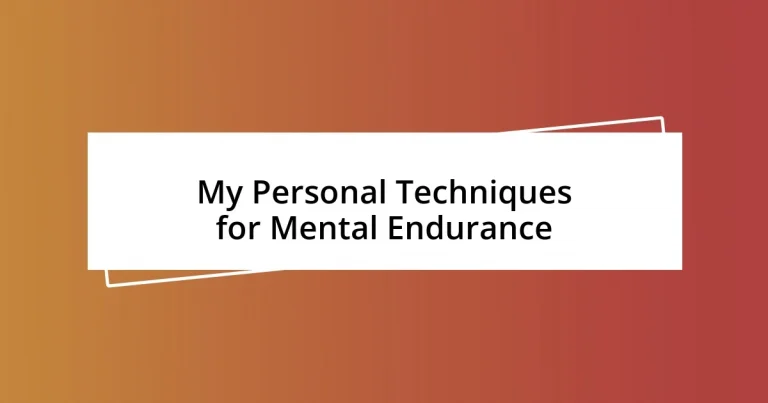Key takeaways:
- Mental endurance techniques such as breaking tasks into smaller steps, visualization, and mindfulness enhance focus and resilience during challenges.
- Setting realistic and achievable goals, along with establishing a consistent routine, fosters motivation and a sense of accomplishment in personal growth.
- Tracking progress and celebrating small successes, along with maintaining accountability and flexibility, are crucial for overcoming obstacles and staying motivated.

Understanding Mental Endurance Techniques
Mental endurance techniques are all about building resilience and pushing through discomfort. I remember a time when I was preparing for an intense project at work. It felt overwhelming, but I found that breaking tasks into smaller, manageable steps helped me stay focused. Have you ever felt like you were drowning in responsibilities? This approach not only calmed my mind but also transformed daunting challenges into achievable goals.
One key technique I’ve discovered is visualization. Picture yourself achieving your goal, whether it’s finishing that marathon or acing an important presentation. It sounds simple, but I found that creating a vivid mental image can ignite motivation when times get tough. Have you tried visualizing your success? In those moments of doubt, I’d often close my eyes and picture crossing the finish line, feeling that surge of accomplishment.
Another aspect of mental endurance is mindfulness. During stressful moments, I would often take a step back to breathe and gain perspective. It’s fascinating how a few deep breaths can center your thoughts and enhance your focus. Have you ever noticed how a moment of stillness can shift your entire mindset? Personally, I found that integrating mindfulness into my daily routine not only improved my endurance but also enriched my overall well-being.
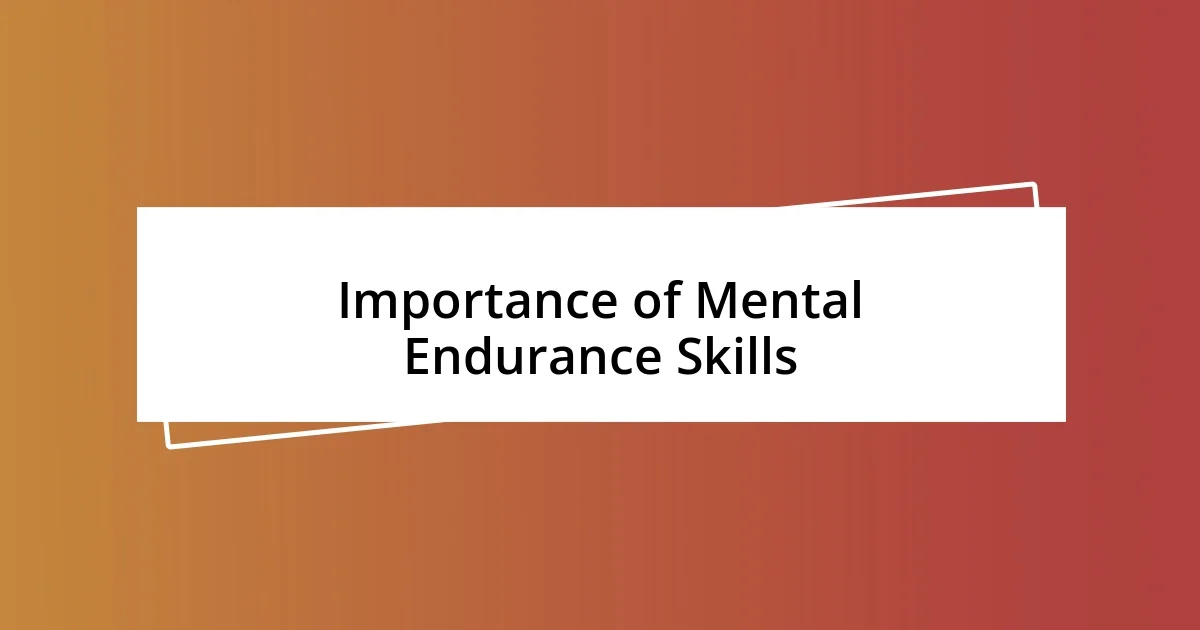
Importance of Mental Endurance Skills
Mental endurance skills are paramount for overcoming challenges and achieving long-term goals. I remember preparing for a crucial exam that felt like a mountain I had to climb. I realized that each study session was a step up that mountain, and it taught me how crucial it is to persevere, especially when I hit a mental roadblock. It’s interesting how mental stamina can transform a seemingly insurmountable task into a series of smaller, achievable milestones.
Through my journey, I’ve also learned that mental endurance sharpens decision-making skills. When we encounter stress, our minds can become clouded. But I found that the ability to press on and maintain clarity under pressure allowed me to make better choices. Have you ever found yourself in a tough spot where your decision-making was clouded by anxiety? I can recall a work scenario where I had to present crucial information. Focusing on my mental endurance helped me stay composed, resulting in an incredibly successful presentation.
Furthermore, developing mental endurance increases overall life satisfaction. The more I challenged myself, the more I found joy in small victories. Interestingly, I noticed that what used to seem overwhelming now brought a sense of accomplishment. This shift in perspective has been a game-changer for my personal growth. Isn’t it amazing how pushing through hardship can reveal our true strengths?
| Benefit | Description |
|---|---|
| Overcoming Challenges | Mental endurance allows individuals to face difficulties with resilience, transforming overwhelming tasks into manageable steps. |
| Improved Decision-Making | It enhances clarity under stress, leading to better choices and outcomes in high-pressure situations. |
| Increased Life Satisfaction | Developing mental stamina fosters a sense of achievement in everyday life, contributing to overall happiness. |
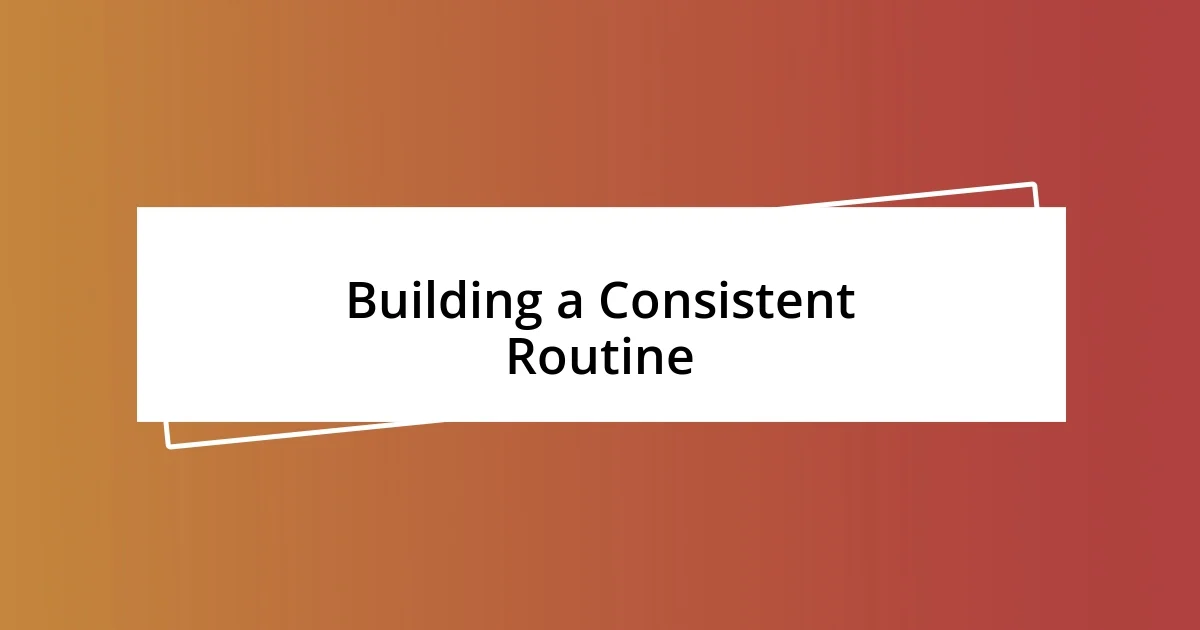
Building a Consistent Routine
Building a consistent routine has been one of the most effective tools in my mental endurance arsenal. I still recall the struggle of my early mornings when I often hit the snooze button one too many times. Establishing a wake-up schedule changed everything for me. Now, I rise at the same time each day, and that small act sets a tone for the rest of my day. This consistency creates a comforting rhythm that reduces anxiety and fosters focus.
To help you build your own reliable routine, consider these techniques:
- Set Specific Goals: Define clear, achievable objectives for your day. This gives you direction and purpose.
- Prioritize Morning Tasks: Tackle important tasks when your mind is freshest. Morning clarity can enhance productivity.
- Incorporate Breaks: Short breaks are vital; they refresh your mind and help maintain stamina throughout the day.
- Reflect and Adjust: At the end of the week, take time to reflect on what worked and what didn’t. Adapt your routine as needed to keep it effective.
By integrating these practices into my life, I not only established a structure but also cultivated a mindset that embraces challenges head-on.
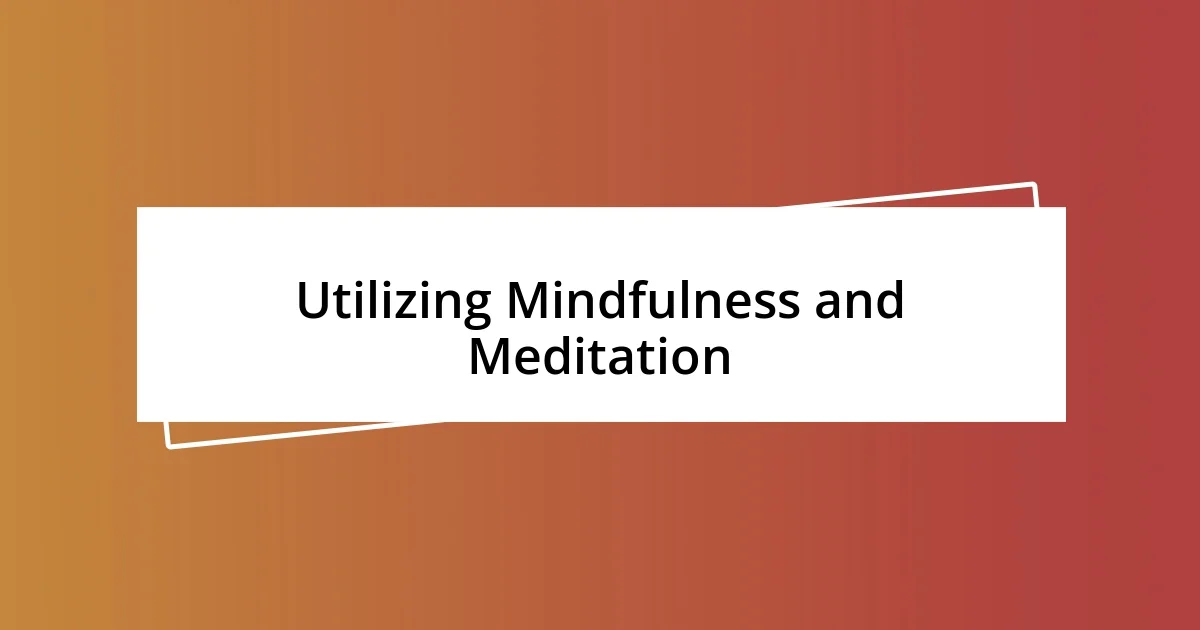
Utilizing Mindfulness and Meditation
Utilizing mindfulness and meditation has significantly enhanced my mental endurance. I vividly remember a challenging period when I felt overwhelmed by daily stresses; it was then that I turned to meditation. Just a few minutes each day to sit quietly and focus on my breath grounded me in ways I never expected. Have you ever noticed how quickly your thoughts can spiral? By simply observing my thoughts without judgment, I found clarity amidst chaos, which empowered me to handle everything life threw my way.
Incorporating mindfulness into my everyday routine has been a revelation. For instance, during a hectic workday, I learned to pause and focus on the present moment. Taking a few deep breaths, even for just a minute, transformed my perspective. Suddenly, that daunting project didn’t seem like an impossible mountain to climb. It became just another task on my to-do list. Isn’t it remarkable how a slight shift in focus can lead to such a profound change in our experience?
Meditation, on the other hand, has enabled me to cultivate resilience. I recall the first time I attempted a longer meditation session; it felt like an eternity. Yet, as I persevered, I discovered a surprising inner strength. Each session contributed to my overall mental stamina, making me more equipped to deal with stressors outside of meditation. Engaging in this practice regularly not only nurtured my mental endurance but also offered a refuge where I could rejuvenate my spirit and sharpen my focus.
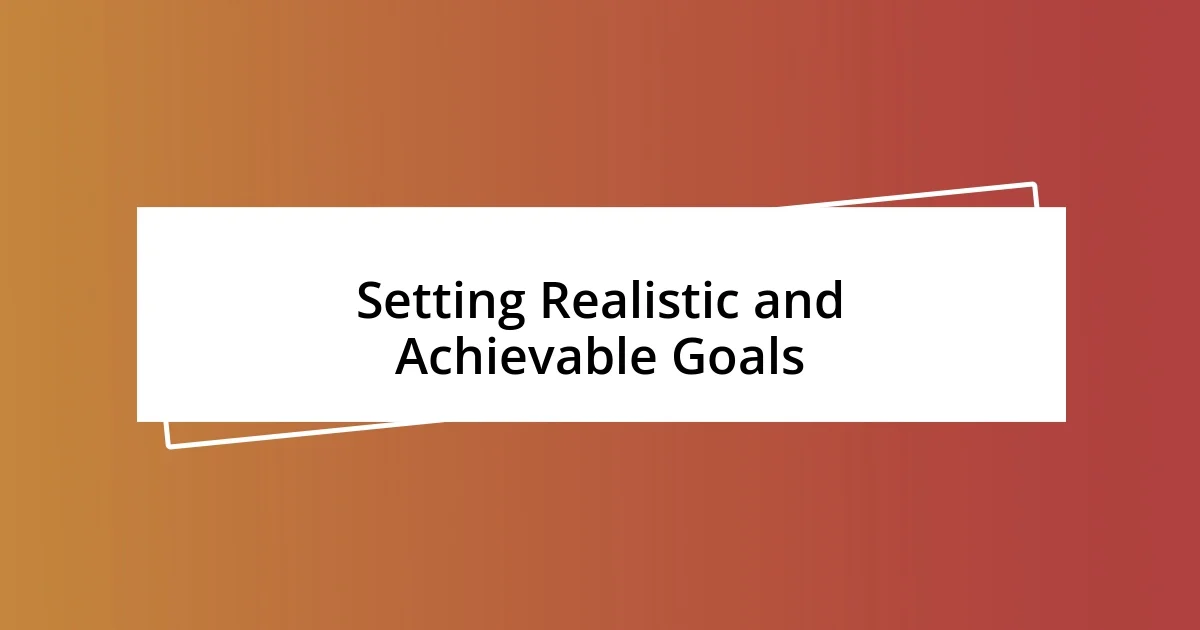
Setting Realistic and Achievable Goals
Setting realistic and achievable goals has been a game-changer in my journey toward mental endurance. I used to set enormous goals that left me feeling overwhelmed and disappointed when I missed the mark. Now, I focus on smaller, bite-sized objectives, which feels much more manageable. For instance, instead of aiming to read a whole book in a week, I now challenge myself to read just a chapter a day. This shift has not only boosted my motivation but also filled me with a sense of accomplishment that keeps me going.
When I look back at my early attempts to set goals, I realize I often ignored my current capabilities. I vividly recall wanting to run a half-marathon without any prior training. The idea seemed thrilling, but the reality was grueling. Gradually, I learned to break that lofty ambition into smaller achievements—starting with just a mile. Each small victory built my confidence, proving that setting pragmatic goals really helps in fostering endurance and resilience. How have you approached your own goals? Finding balance is key; it’s about recognizing your limits while still striving for growth.
I’ve also discovered the importance of timeframe in goal-setting. I remember scheduling a month to complete a challenging project at work. With a clear deadline in sight, I chunked tasks into weekly targets. This not only streamlined my focus but also prevented the stress of last-minute cramming. Realistic timeframes provide a structure that keeps me accountable and helps maintain momentum. Can you recall a time when setting a deadline helped you overcome procrastination? Taking these steps has shaped how I pursue my goals and has honed my mental endurance along the way.
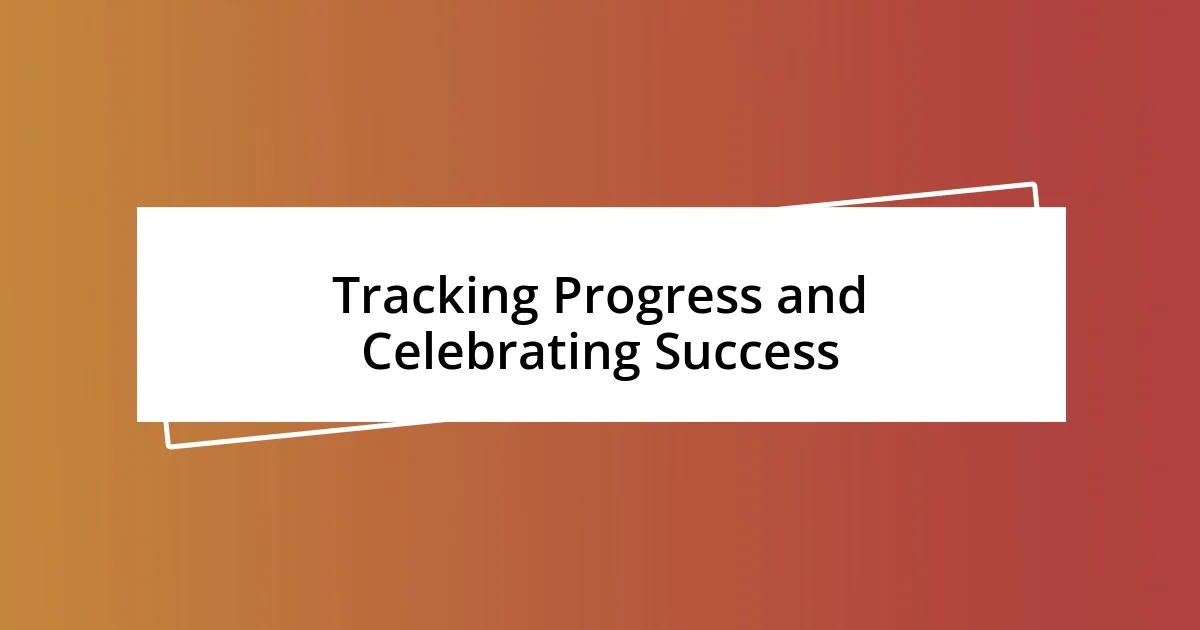
Tracking Progress and Celebrating Success
Tracking my progress has become an essential part of my mental endurance journey. I maintain a journal where I jot down my daily experiences and their outcomes; it’s almost therapeutic. Reflecting on challenges and victories, big or small, allows me to see how far I’ve come. Have you ever flipped through old notes and felt a rush of pride? That feeling of acknowledgment fuels my motivation to keep pushing forward.
Celebrating success, however small, is equally important to me. I remember finishing a particularly tough meditation session that left me feeling accomplished. Instead of brushing it aside, I treated myself to an evening of my favorite activities, like cooking a comforting meal or enjoying a good book. The sense of joy in celebrating these moments fosters a positive mindset, reinforcing my commitment to growth. Don’t underestimate the power of these small celebrations; they can transform your perspective on progress.
I also find accountability partners enhance my tracking process. Sharing goals with a close friend and checking in regularly creates a supportive space for both of us. I vividly recall after one uplifting conversation, we both shared our recent successes, no matter how trivial they seemed. Expressing my journey with someone else not only keeps my focus sharp but also adds a layer of joy in celebrating achievements along the way. When was the last time you shared a milestone with someone? It’s amazing how much encouragement we can draw from each other’s victories!
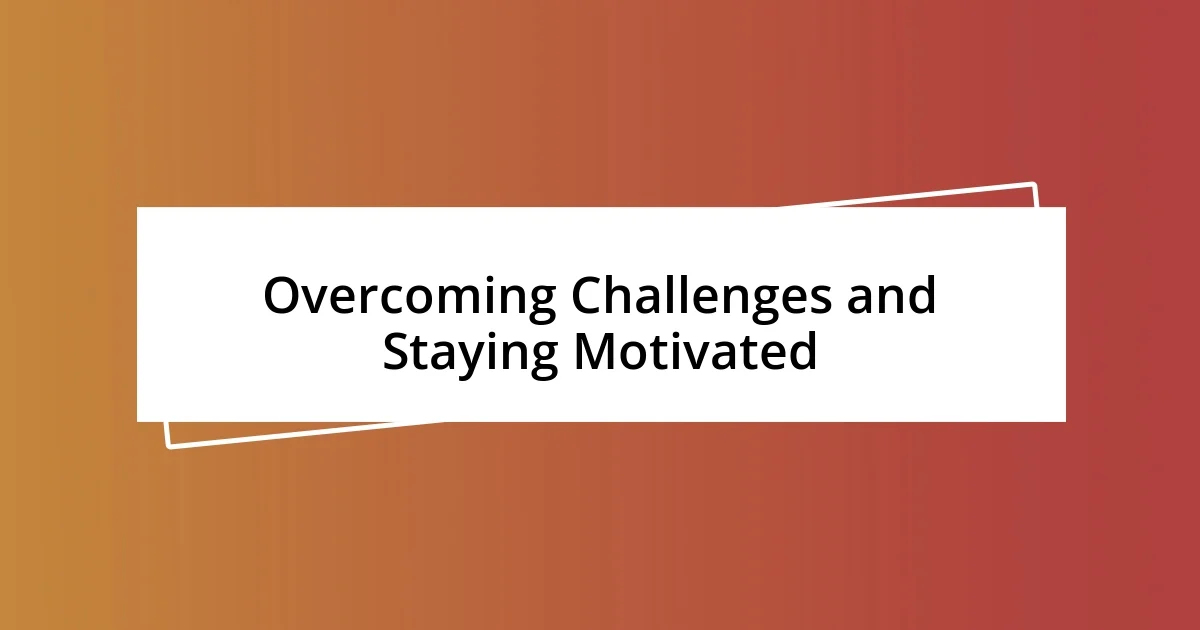
Overcoming Challenges and Staying Motivated
Staying motivated through challenges requires a mindset shift that I’ve found quite effective. I remember one particularly tough week when everything seemed to go wrong—work was stressful, and personal challenges felt overwhelming. Instead of succumbing to negativity, I turned to my “three-step challenge.” I would identify one small task I could accomplish each day, whether it was organizing my workspace or taking a short walk. This simple practice not only helped me regain focus but also ignited a sense of achievement that brightened my outlook.
When the going gets tough, I often remind myself of my “why.” I think back to a time I was training for a grueling hike with friends. The training was exhausting, and sometimes I doubted my commitment. However, recalling my motivation—to explore breathtaking landscapes and strengthen bonds with my friends—filled me with renewed energy. This emotional connection to my goals kept me pushing through the discomfort. Have you ever tapped into your deeper reasons to fuel your determination? It’s a powerful strategy that transforms challenges into stepping stones.
I also embrace flexibility in my approach to obstacles. During one project, I faced a setback that threatened to derail my enthusiasm. Initially, I felt disheartened, but then I paused and reassessed the situation. I asked myself how I could adjust my plan rather than dwell on the failure. By reframing my perspective, I quickly formulated a new strategy, which eventually led to a successful outcome. Adapting to challenges has since become a cornerstone of my journey, emphasizing that it’s not just about the destination but how we navigate the journey itself. What challenges have you adapted to successfully? Each moment teaches us resilience, and I’m constantly learning from these experiences.












